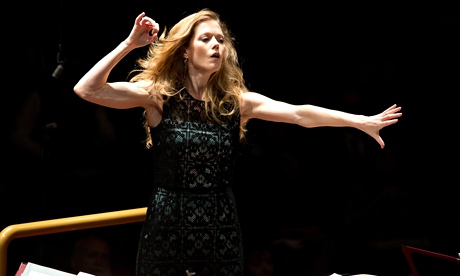
It might seem prescriptive to say that singers should on no account attempt to conduct their own concerts, but I’m going to say it anyway. Nobody has forgotten the 1999 occasion when the tenor José Cura tried to sing and conduct the Philharmonia simultaneously, flapping his arms, as more than one witness put it, like a huge bird attempting flight.
Barbara Hannigan, appearing with the Britten Sinfonia as both soprano and conductor, at no point evoked a huge bird, nor did she look ridiculous in any other way. But there is something about a singer obviously directing his or her orchestra that breaks a kind of contract with the audience.
For Anne’s big act-one scene from Stravinsky’s The Rake’s Progress, she conducted the woodwind introduction before turning around, in character, and starting to sing; thereafter, however much she tried to blend conducting gestures in with her characterisation, it looked fatally self-conscious. In any emotionally complex aria such as this, or Mozart’s Bella Mia Fiamma, Addio, which she sang in the second half, the orchestra is in part a representation of the subconscious – and that’s not something the singer should be able to turn on and off by waving. Her voice, sounding bright and agile but a little small, tended to mimic the violins’ accents rather than soaring above the orchestra in long lines.
It was frustrating, especially as one suspected the Britten Sinfonia, led by violinist Jacqueline Shave, didn’t need as much direction as Hannigan insisted on giving. Perhaps Haydn’s Symphony No 49 and Stravinsky’s Pulcinella Suite would have been a stretch to perform conductorless, but this ensemble is often electrifying that way. As it was, those and the two Mozart overtures – from Idomeneo and La Clemenza di Tito – sounded warm but opaque and generalised, with little nuance in the balance. This was a collaborative venture, we were told – but surely a big part of being collaborative is knowing when to hand over control.
• At Saffron Hall, Saffron Walden, on 9 May. Box office: 0845 548 7650. Then at the Brighton Dome on 12 May. Box office: 01273 700 747.

